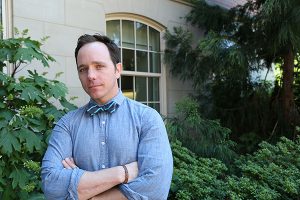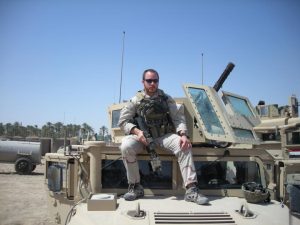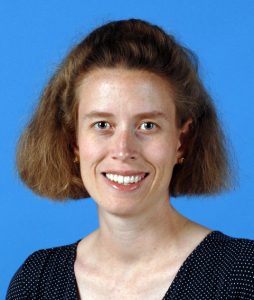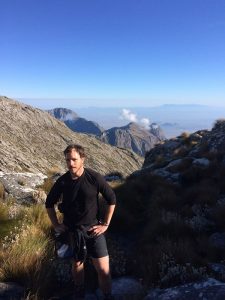High school dropout, Green Beret medic who served three tours in Iraq, Special Forces medic instructor at Fort Bragg, lymphoma fighter who is free of cancer today, and future physician and researcher — the remarkable path to medicine of rising third-year UNC medical student Eric Strand.

High school dropout, Green Beret medic who served three tours in Iraq, Special Forces medic instructor at Fort Bragg, lymphoma fighter who is free of cancer today, and future physician and researcher — the remarkable path to medicine of rising third-year UNC medical student Eric Strand.

by Zach Read – zachary.read@unchealth.unc.edu

UNC medical student Eric Strand had completed the tenth grade at his Alabama high school in 1997 when he dropped out and left home. Although perfectly capable of academic achievement, breaking free from the structure of school seemed like a great idea at the time. The only problem was that he didn’t know which direction he should go.
To make ends meet, he performed odd jobs and worked in a grocery store, several fast food restaurants, and a steel mill where a job placement agency had found a position for him. Conditions in the mill were miserable, however, and morale was low, so after a few months, he made another change.
“I quit the mill, couch surfed for a while with friends, and quickly wore out my welcome,” he says. “I had too much pride to continue living that way – no job and no place to live – so I got my GED and went down to the local Army recruiting office and joined.”
He tested well on his IQ exam for the military, and his first job in the Army came in 1999 as a counter intelligence agent. Initially, the position excited him because he thought he might want to become a spy, but the people he worked with didn’t form the kind of team he hoped to be part of. After two years in intelligence, he pursued Special Forces.
“I wanted to work with good people – people I respected and trusted and who would contribute to a team environment,” he explains.
So, he signed up to become a Green Beret. A 24-day application program followed, during which his mental and physical capabilities were tested by sleep and food deprivation; personality and IQ tests taken under duress; long, grueling runs and several-day marches while carrying heavy weight; obstacle courses; land navigation scenarios; and a whole a lot of time spent alone.
One of the last challenges was a 50-mile ruck march, alone, with 90 pounds on his back, in less than 36 hours.
“I was destroyed physically,” he admits. “They tax you to the max to see if you’re capable of the demands.”
He completed the initial program and was among a small group of applicants selected for the Green Beret’s two-and-a-half-year training phase.
“I had no clue that I could make it — every step of the way I expected to fail.”
The Toll of Service

Green Berets serve in a 12-member unit. Each member of the team has a role: weapons, communications, engineer, or medic. As a boy, Eric had always wanted to be a scientist of some kind, so becoming a medic was at the top of his wish list. His results on the military’s IQ test determined that he’d be a good candidate for the job.
“For me, being a medic was the most interesting option,” he says. “After they placed me as one, I had a couple months before training, so I got an anatomy coloring book and began thinking about medicine as something that could be part of my life beyond the military.”
For the next several years, from 2004 to 2009, he faced a constant cycle of deployment, time off, training, and redeployment. His overseas experiences in Iraq included three tours of duty – in Mosul, Baghdad, and Diyala Province – that lasted eight months to a year apiece. The five months between deployments were broken into three months of training and two months when he could be at home with his wife. Eventually, the time away from home created too much distance between them for their marriage to overcome – a reality many Special Forces members face — and they divorced.
“War is so much more than combat and killing,” says Eric, whose older two children live in Tennessee with his ex-wife today. “There are other costs involved, including chronic disease and divorce, the latter of which occurs at an astronomically high rate within the Special Forces because of the demands of the job.”
During his deployments, his team took on many challenges, including going into communities to produce intelligence, conduct raids, and lead Iraqi soldiers in combat. In one instance, he spent an hour searching the team’s destroyed vehicle for his deceased friend’s leg – he knew that his friend’s wife would want it buried with him.
He communicates about his experiences in conflict through painting, music, and writing, some of which has appeared in the UNC School of Medicine’s student-run literary magazine, Iris. A prose piece he recently wrote, “Farewell Dear Ghost,” explores the process of moving on after someone gives their life for you. Set to appear in an anthology of veterans’ stories called Incoming, published by So Saw We All, a literary and performing arts nonprofit organization, the piece is about one of his teammates, Jason Brown. On his third deployment, Eric was on the assault team for a raid. Jason was on security. Jason recognized a threat and ran into the courtyard of the target house along with a handful of Iraqi soldiers while the team was still several houses down moving towards the target. There was a heavy machine gun set up in that courtyard and Jason was killed.
“If he hadn’t done that, I would have been among the first through that gate,” Eric says. “I wrote the piece to highlight the struggle of making that sacrifice worthwhile by learning to move on and make a future that is worth someone else’s death. Several other people were wounded that day and I treated them for several hours before getting them to the hospital. Ultimately, the experience was an important factor in my decision to go to medical school.”
A Good Heart

Shortly after Eric’s overseas responsibilities ended, a group from UNC Medical Center, including Bruce Cairns, MD, and Preston “Chip” Rich, MD, visited the Joint Special Forces Medics Training Center (JSOMTC) at Fort Bragg, where Eric was an instructor, to learn more about the level of training and expertise of Special Forces medics.
“We discovered there’s no better medic on the planet than the 18-Delta Special Forces Medical Sergeant,” says Dr. Cairns, director of the North Carolina Jaycee Burn Center at UNC Medical Center. “It’s more difficult to become a Special Forces medic than it is to become an NFL football player – it’s truly amazing. We are talking about the very best of the best.”
After the visit, the UNC group launched the Advanced Medic Instructor Training (AMIT) program, a collaborative effort that furthers the medical training and education of JSOMTC medic instructors by inviting them to UNC Hospitals for rotations.
In 2009, Eric became the Fort Bragg point of contact for AMIT, and as part of the program, he did rotations at the Burn Center. At the time, he was pursuing his undergraduate degree at Campbell University’s Fort Bragg campus. After experiencing the educational and working environments at an academic medical center, he felt prepared to add pre-med requirements to his studies — the requirements were taken in four-hour classes, four nights a week, after work.
“Medical school is such a daunting consideration when you’re still an active duty service member – I didn’t think it was possible to pursue it at that time – but being in that environment, thanks to AMIT, provided the inspiration and encouragement I needed,” he says.
Since enrolling in medical school, he has found the UNC School of Medicine welcoming, even though his age, background, and set of experiences differ so much from other students’.
“UNC appreciates true diversity,” he says. “The admissions committee builds classes of people that are willing to learn from each other, accept each other’s experiences, and be genuinely curious about each other without being voyeuristic. If UNC were a less diverse medical school in terms of background, education, and life experience, it would have been much harder for me to fit in. I interviewed at other schools and didn’t feel I would do as well socially. UNC has a good heart.”
The Patient

Eric met Shiara Ortiz-Pujols, a UNC surgery resident training to become a burn surgeon so that she can help people overcome devastating burn injuries, during his rotations at the Burn Center.
“His pursuit was immediate,” says Shiara. “He was persistent in a Special Forces way and he swept me off my feet despite my best efforts not to let him.”
Eric credits Shiara for being a resource for him during his medical school application process and in his approach as a medical learner at UNC. He points out that although they come from different countries — Shiara grew up in Puerto Rico — the two have much in common.
“She’s been a mentor for me,” he says. “Mentorship is important to her. She comes from a working-class family and kind of defied the odds by becoming a doctor, and it’s important to her to assist people who haven’t had a path to medical school outlined for them.”
Three years ago, however, in the months before he enrolled in medical school — and only two weeks after their engagement — he was diagnosed with lymphoma. The lymphoma had presented itself strangely, appearing on a bone on his forearm.
“We were stunned by the news,” he says. “But we decided to move quickly and get married because we wanted to have children – the ‘in sickness and in health’ part of the vows were in full effect from the start.”
After diagnosis, he began receiving treatments at the North Carolina Cancer Hospitaln the morning he received his final radiation treatment two years ago, he returned to the hospital later that evening to support Shiara during labor. Today they have Adelisa, their daughter.
“It’s no surprise that the day Adelisa was born was a whirlwind,” says Shiara, whose labor began while she was teaching that morning. “But it was even more so because it marked an end of his treatment and a new beginning for us.”
It is rare to find an individual who has done so many things, at a young age, and has managed to excel and progress in all of them. The maturity he showed in approaching his disease was, I believe, a reflection of both his amazing life experiences and his strength as an individual. –Joel Tepper, MD, Hector MacLean Distinguished Professor of Cancer Research
Although Eric admits to feeling helpless at times after his diagnosis and at periods throughout his treatment, confronting his illness and receiving care from radiation oncologist Dr. Joel Tepper, MD, bone and soft tissue orthopedic oncologist Dr. Robert Esther, MD, who performed Eric’s surgeries, and leukemia, lymphoma, and myeloma physician and researcher Dr. Peter Voorhees, MD, taught him a great deal about the kind of doctor he wants to be.
“As a radiation oncologist, for example, you’d expect Dr. Tepper to be a super-specialist, so honed in on one area that maybe other areas of the practice of medicine aren’t as emphasized,” Eric says. “But I was struck by how much he knows about the basics – about how to sit down and talk to patients and explain to them what he thinks they should do, based on the evidence, and discuss with them the benefits and drawbacks of their options. He was so good at informed consent and communicating with me as a patient and in making sure that all the members of all the different health-care teams were on the same page. He’s good at being a doctor, not just a specialist.”
The experience showed him that there are a few core things that every doctor needs to have: “Just being human, being a good communicator, and those are things you can do in any specialty.”
Last summer, through UNC School of Medicine’s Office of International Activities, Eric took an opportunity to conduct international research in Malawi as part of an overseas educational program with UNC Project-Malawi. It was rewarding for him to go into the developing world and conduct work that required a completely different skill set than what he’d done in the Army. While there he participated in hematology/oncology research, which resulted in receiving the 2014 American Society of Hematology’s HONORS Award – he was one of 19 medical students nationwide to receive the award.
As he prepares to begin his third year in medical school, both his personal and research experiences are pushing him toward specializing in pediatric hematology/oncology, even though at first he feared it would bring back all the feelings of being on chemotherapy.
“I want to do research in that area to help ameliorate the long-term problems associated with curing children of lymphoma,” he says. “Many children suffer lifelong effects from the treatments – they may have halted social and psychological development, heart failure down the road, and so on.”
Today Eric is free of cancer, and while he continues pursuing medicine as a career, he often reflects on the unusual path he’s followed to UNC and how he plans to put into practice a key value he learned in the military: emphasizing shared successes and failures over individual accomplishments, a trait, he believes, UNC also promotes. He will apply it to the type of provider he wants to be, one focused on the end result for the patient. Shiara believes that his life experience has already contributed to his success as a medical student and will enhance the care he gives in the future. But he refuses to take any opportunities for granted.
“Education has been a priority for me since I returned from service,” he says. “I joined the Army because it hadn’t been one before. Getting my undergraduate degree and now pursuing medicine as a career are ways for me to correct that period of my life.”
“Eric has overcome so much to get here. He epitomizes the kind of individual the people of North Carolina want to see coming out of our great public medical school. In addition, he’s been vital to our partnership with the Army and the creation of the PA school at UNC. He’s a true American hero.” –Bruce Cairns, MD, John Stackhouse Distinguished Professor of Surgery